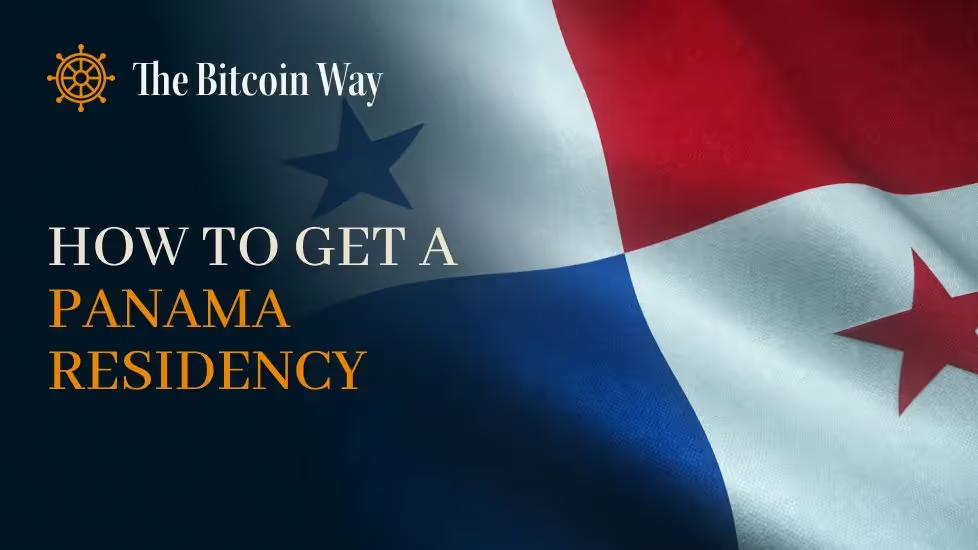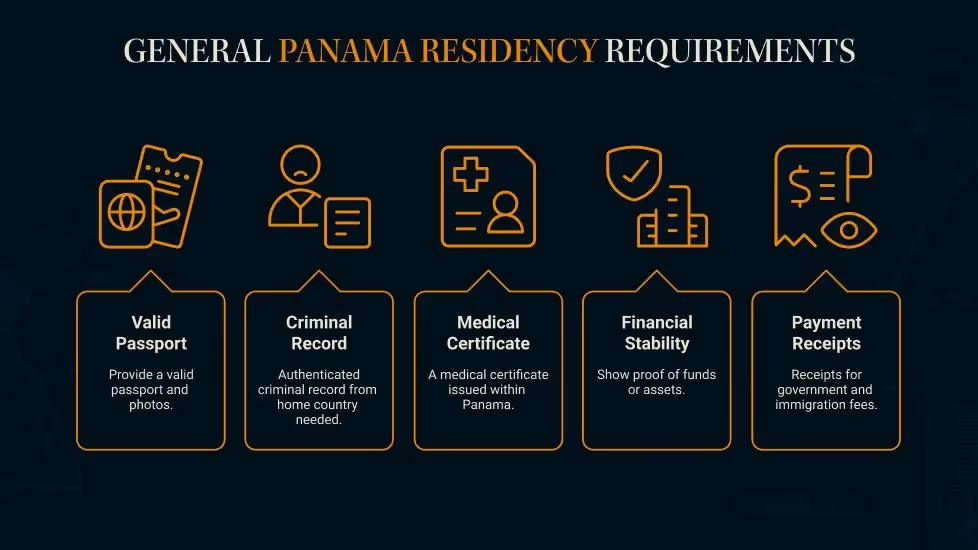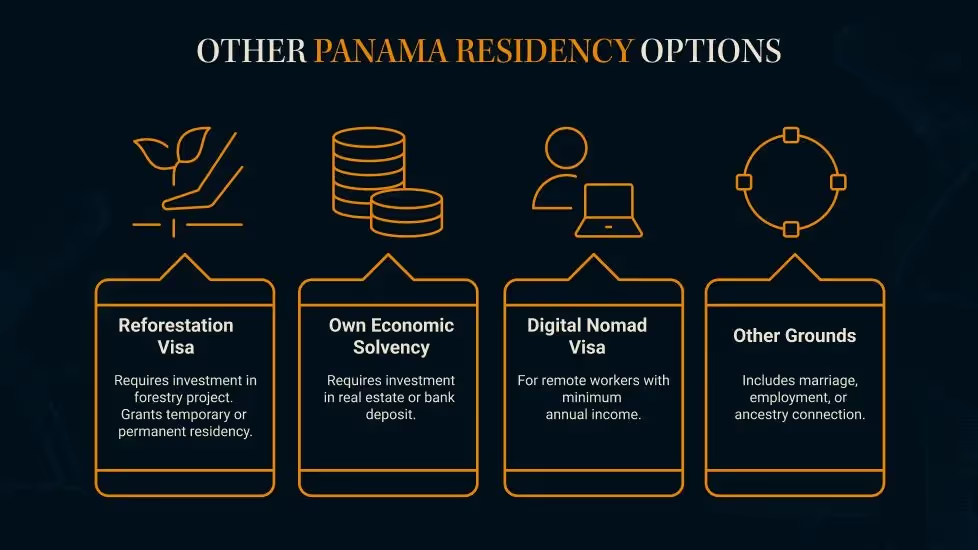How to Get a Panama Residency: Requirements, Costs & More

In this article:
Many residency programs are undergoing significant changes that are, unfortunately, making them less appealing, especially to Bitcoiners. For example, Portugal, in late 2024, significantly restricted the Non-Habitual Resident (NHR) tax regime, which guaranteed low taxes for new residents. Meanwhile, the EU, as a whole, is tightening capital controls, capping cash transactions, and ramping up oversight on bitcoin.
If you're looking for a destination that is friendly to a Bitcoiner, it’s probably time to look elsewhere.
Panama is one of the places catching the attention of many as an option. Getting residency in the Central American country is relatively fast and comes with a comparatively low amount of paperwork. Also, foreign income is generally not taxed, you don’t need to live there year-round, and you can qualify for citizenship after 2-5 years.
This guide covers how to get residency in Panama, the process, the available visa options, and why many bitcoin holders are turning to the country as their Plan B.
Why Should You Consider Getting a Panama Residency?
Panama stands out as a great option for several reasons, and the following are the most notable:
- No tax liability on income earned outside the country.
- Bitcoin friendly laws and growing community
- Fast and affordable residency process
- Clear legal path to full citizenship
- No central bank in the country
- A dollar-based economy, as the US dollar is a legal tender here.
- No military in the country
- Safe and politically stable
- Strong infrastructure and services
- No need to relocate immediately
- Warm tropical climate with year-round sunshine
- Great culture and food
- Legal consistency, especially when it comes to private wealth.
- Well developed healthcare system
- No language exams or long delays.
What Are the General Panama Residency Requirements?
Panama offers several immigration programs, and for all of them, the basic requirements are generally the same.

Here’s what is generally required:
- A valid passport and a few passport-sized photos
- A criminal record certificate authenticated from your home country or by the Panama consulate
- A medical certificate issued in Panama
- Proof of financial stability, such as a bank statement, property ownership documents, or corporate records
- Payment receipts for government fees, especially to the treasury and the immigration department
You may also need a letter from your employer in Panama, proof of investment in this country, marriage or birth certificates (if applying for family members), local company registration documents, and other supporting paperwork.
All documents must be notarized, and foreign documents must be verified, such as through the Panamanian consulate. Before choosing a particular visa type, confirm the list of required documents, as it can vary from one program to another.
The entire process can go more seamlessly if you engage the services of a local lawyer with experience in immigration.
How Much Does It Cost to Get a Permanent Residency in Panama?
The cost varies depending on the program you choose:
Besides the $200,000 property investment or bank deposit requirements, the minimum cost for the Friendly Nations Visa is generally cost-friendly. The amount you will end up paying depends on whether you plan to start a business, secure a job, or purchase property.
You can book a call to find out how much it will cost you based on your circumstances.
The Qualified Investor Visa requires an investment of at least $500,000 in real estate, stocks, or a bank deposit. This option provides immediate permanent residency, bypassing the temporary residency stage.
For the Retiree (Pensionado) Visa, you need a lifetime monthly pension of at least $1,000 to qualify. If the pension is lower, a property purchase of at least $100,000 is required. However, the pension can't be lower than $750 per month, even with property investment.
Make sure to account for additional costs, such as legal fees, translations, accommodation, medical certificates, police clearance, and government fees, which could easily surpass $1,000.
How to Obtain Residency in Panama: 3 Pathways You Can Explore
Panama offers a variety of immigration programs, and each has its own requirements, processing times, and conditions for applicants.
Below are the main pathways to obtaining temporary or permanent residency in Panama.

Friendly Nations Visa
The Panama Friendly Nations Visa provides a path to residency for citizens of more than 50 countries, including the United States, Canada, most EU nations, and several Latin American and Asia countries.
To qualify for the visa, besides being a citizen of one of the countries on the list, you must meet one of the following conditions:
- Purchase property valued at $200,000 or more
- Open a fixed-term deposit of at least $200,000 in a Panamanian bank for a three-year term
- Secure a job contract with a Panamanian company (which can be arranged through your own business)
The applicant first receives temporary residency for two years. After that, they can submit their application for permanent residency.
Qualified Investor Visa
This is the quickest way to get permanent residency in Panama as it is granted right away, skipping the temporary residency phase.
There are three investment options:
- $500,000 in real estate
- $500,000 in stocks or bonds
- $750,000 in a fixed-term bank deposit
Investments in securities and deposits must be maintained for at least five years.
The application process can be done remotely with documents submitted through an attorney, and a visit to Panama is only necessary at the final stage to obtain the ID.
Retiree/Pensionado Program
The Retiree/Pensionado Program is popular among retirees. You must receive a monthly lifelong pension of at least $1,000 to qualify. If your pension is lower (starting at $750), you must purchase property worth at least $100,000.
The visa is issued for an indefinite period and doesn’t require renewal. You aren’t required to live in the country permanently, but you must visit at least once every two years.
Residents also enjoy a range of discounts:
- Up to 50% on entertainment
- 25–30% on airfare and transportation
- 15–20% on healthcare and medications
The pension must be an official one: provided by the government or an insurance company, with confirmed regular payments and lifetime benefits.
Other Panama Residency Options

If the standard visa options don’t meet your needs, Panama offers alternative routes to residency. These options are less common but can fit specific requirements or goals.
Here’s a brief overview of alternative options:
- The Reforestation Visa requires an investment of at least $100,000 in an approved forestry project. It grants temporary residency with the option to apply for permanent residency. With a $350,000 investment, permanent residency is granted immediately.
- The Own Economic Solvency Visa requires a minimum investment of $300,000 in real estate, a bank deposit, or a combination of both.
- The Digital Nomad Visa is for remote workers with an annual income of at least $36,000. This provides residency for 9 months, with the possibility of extending for another 9 months.
- Other grounds include marriage to a Panamanian citizen, an employment contract, or the Crisol de Razas (Melting Pot) program, which qualifies you based on your ancestry connection to the country. These options may require continuous physical presence in the country.
Why Are So Many Bitcoiners Moving to Panama?
Panama's residency program is becoming an increasingly popular choice for Bitcoin holders.
The reason is straightforward: privacy is respected in the country, and financial matters are not impacted.
Panama doesn’t tax income earned outside the country. Activities like bitcoin trading are exempt from fiscal oversight. The government is creating a conducive legal environment through appropriate changes in the law.
In Panama, you can own and conduct transactions with bitcoin. While banks are still cautious about cryptocurrencies, it is possible to legally and securely access the financial infrastructure with the assistance of lawyers and reliable structures, such as trusts.
Panama is also attracting the attention of bitcoiners because of the steps it is taking to accommodate Bitcoin. For example, in late April 2025, Panama City's Mayor Mayer Mizrachi signed an agreement with a local bank to process tax and service fee payments in bitcoin. The city is also planning to establish a Bitcoin reserve.
Panama is not just a tax haven for bitcoin HODLers but also a way to protect your privacy.
That’s why many people choose it as their Plan B.
Benefits of a Panama Residency Visa
Panama’s residency program is well-suited for individuals seeking flexibility, asset protection, and a simple route to immigration status without excessive bureaucracy.
Here are the main advantages:
- No tax on foreign income
- Direct route to permanent residency and citizenship
- No language tests
- Quick processing, within several months
- Ability to open bank accounts and businesses
- Family residency for the applicant and dependents
These conditions make Panama particularly attractive for those seeking a flexible Plan B.
Get Your Residency in Panama With The Bitcoin Way
You don’t need to worry about understanding all the details of Panamanian law – we’ll handle that for you. The Bitcoin Way team will guide you in selecting the proper visa, gathering the necessary documents, completing interviews, and opening a bank account in Panama.
We collaborate only with reputable lawyers and services. We prioritize security at every stage and tailor a strategy based on your lifestyle, business, and objectives. We understand that this is more than just relocation. It is about safeguarding your assets, freedom, and privacy.
Ready for the move?
Book a free consultation, and we’ll guide you through obtaining residency in Panama!

Disclaimer: Please be advised that the information provided in this article is intended for general knowledge and informational purposes only, and does not constitute tax advice. The complexities of tax law vary significantly based on individual circumstances, jurisdiction, and ongoing legislative changes. We urge you to consult with a qualified tax advisor or professional for personalized guidance tailored to your specific situation before taking any action that may have tax implications. The Bitcoin Way expressly disclaims any liability for decisions made or actions taken based on the information provided in this article.
FAQ
How can I get residency in Panama?
Select the visa that meets your needs and abilities, gather the necessary documents, and submit your application for processing. Preferably, get the help of a consultancy, such as The Bitcoin Way, or a Panamanian lawyer who is experienced in helping foreigners get approved to reside in the country both temporarily and permanently.
What is the golden visa for Panama?
The golden visa for Panama is a program designed for investors. In Panama, the program is called ‘Qualified Investor’ and grants permanent residency to those who qualify. The basic requirement is an investment of at least $500,000 in real estate or stocks. You can also qualify if you deposit and hold at least $750,000 in a local bank.
What is the difference between residency and the golden visa?
The difference between residency and the golden visa in Panama lies in the requirements for applicants and how quickly you can qualify for permanent residency. The golden visa is a type of residency granted through investment that exceeds $500,000 in real estate or stocks, or holding at least $750,000 in a local bank account. This program offers permanent residency immediately and more easily than other programs. Standard residency might require living in the country or holding temporary status for a while before qualifying.
What are the benefits of being a Panama resident?
Panama's residency offers a low tax status on income earned outside the country. The cost of living in the country is generally low, especially compared to that of the US, Canada, and the EU. The economy is stable and dollarized, and there is legal consistency in the country as well as stability and relatively low crime rates.
Is it easy to get residency in Panama?
It depends on the residency program you are applying through and whether you meet the requirements. For example, if you meet the requirements for the Friendly Nations visa or the pension program, the process can go seamlessly, and it can take a few months to have residency granted to you.
How hard is it to immigrate to Panama?
Immigrating to Panama is one of the simplest globally if you meet the criteria. The main requirement is to show proof of income, investments in the country, or a pension. If you have all the necessary paperwork with you, it is generally easy to migrate to Panama. The requirements are also generally not unattainable for most people.
